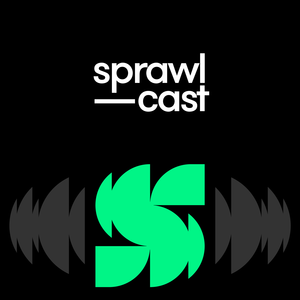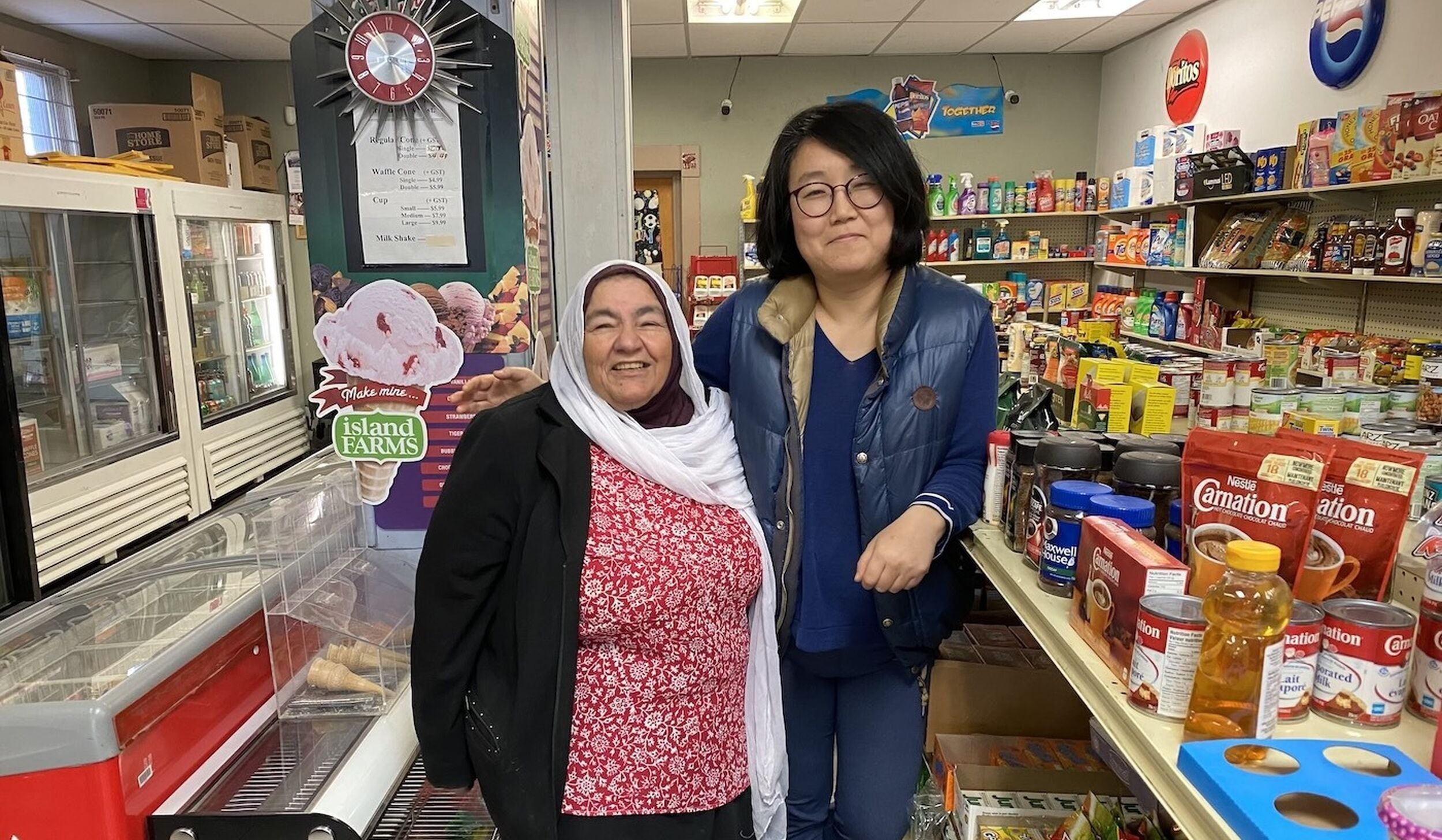
Fariza Thraya and Yeim Kwak of Stanley Jones Grocery. Photo: Jeremy Klaszus
Sprawlcast: More than just a corner store
This is where community happens.
Sprawlcast is a collaboration between CJSW 90.9 FM and The Sprawl. It's a show for curious Calgarians who want more than the daily news grind. A full transcript of the episode is below.
AMY SIDE: I think that for our society—and how we all live on technology and we don't see each other that often—that places like this are a necessity, and they should be celebrated and treasured, and we should try to maintain them so that all of us can have their benefit.
JEREMY KLASZUS (HOST): The other day I was walking through my neighborhood, and I wasn't very happy about it, to be honest.
I was trying to get from East Village to my home in Renfrew, and here's how I used to do that: I used to catch a ride with my wife on her way to work. I'd get a ride down to East Village, and then later in the day I would take car2go home. But now there's no car2go, and transit is not great. It's actually about the same time as walking – sometimes even longer, when you factor in the wait time for a bus.
So all this to say: I was grouchy. I was walking, and I was like, "Ugh, this city." I know we've all been there.
But then, as I was hoofing my way up the hill from Bridgeland into Renfrew, I realized that I would be passing the corner store, Stanley Jones Grocery, and I'd heard from a friend that there were big changes coming to the store. There was a sign out front for a proposed land use change, and when I heard that, my first thought was: are we going to lose the store?
Anyway, as I was walking by, I thought to myself, "Hmm, I should like a bag of those yummy cola gummies."
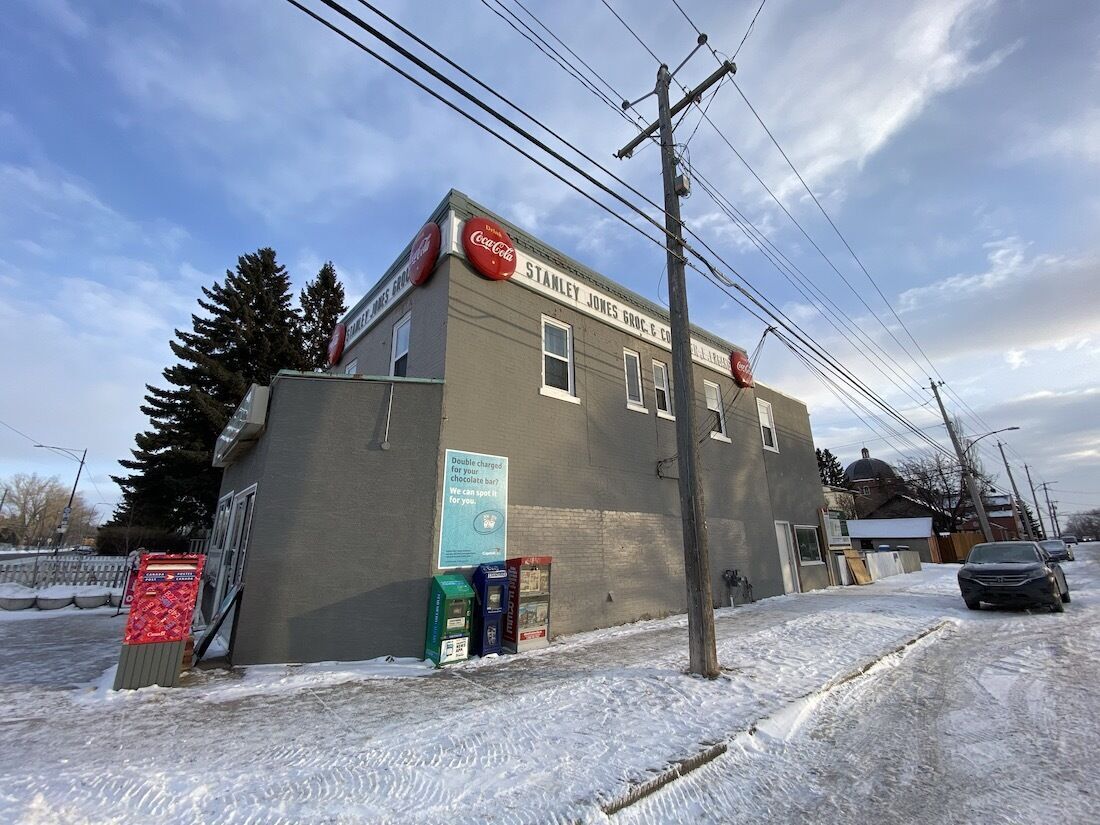
[grocery store door opens]
YEIM KWAK: Hi!
JEREMY: Hello! How are you?
YEIM KWAK: Good!
JEREMY: This is Yeim Kwak, and she's run this store, together with her husband Ricky, for the last four years. It was built in 1913, and over the years a bunch of different families have set up shop there, many of them immigrant families. Yeim and her husband are first-generation immigrants from Korea.
As I bought my candy, I asked Yeim, will the store be sticking around, or is it going to be replaced by something else? It turns out this is a good news story. My assumption was wrong: Stanley Jones isn't closing, but expanding.
Fariza Thraya was sitting nearby, by the front window, and her family has owned this building since 1987. They lived upstairs and ran the store downstairs.
New generations, new dreams
FARIZA THRAYA: I felt so sorry for the gentleman that sold to us. He was older, and he hadn't evolved. He had came from Germany in 1957, and when he had enough money he bought the store in the '60s. Him and his wife ran it, raised their kids here. Their kids had the same idea – babysitting, paper routes, surviving, trying to figure out how to grow up and become part of the community.
And then when they got old, the kids weren't there anymore and they were on their own and they couldn't run the place and they hadn't changed, so you couldn't get a chocolate bar when I bought the store. You couldn't physically pick up a chocolate bar. He would have to go get it. It was like back in Europe 50, 60 years ago. The storekeeper handed you everything. You weren't allowed to touch anything. The counter was in the front. You stepped into the store, but you were not allowed into the store.
It wasn't very welcoming, and I think that was his mistake. The business had died for him because he wasn't moving with the time.
So we said we weren't going to become dinosaurs. Guess what? We became dinosaurs too. We had to leave.
JEREMY: So today, Fariza Thraya and her husband lease the store to Yeim and her husband—but the Thrayas are still very involved in what's happening there.
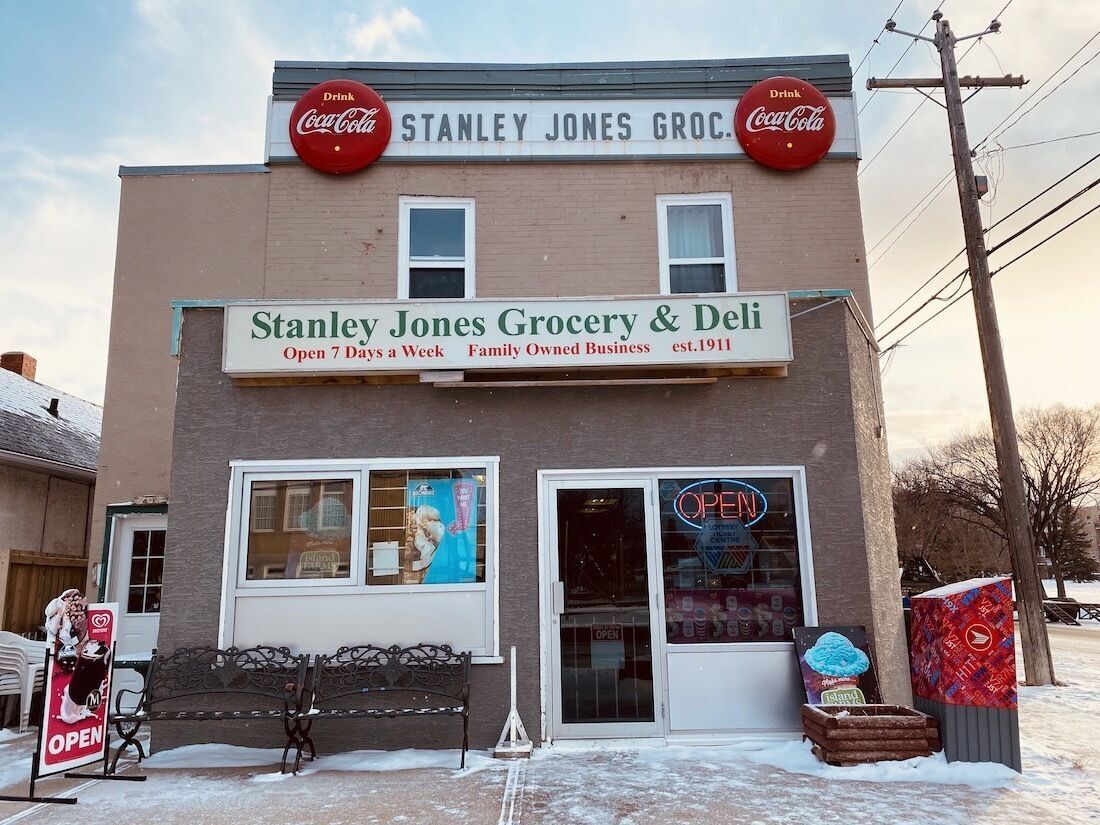
AMY SIDE: So my parents are immigrants, and they came to this country – my dad came in 1969; my mom came in the '50s.
JEREMY: This is Fariza's daughter, Amy Side.
SIDE: And my dad couldn't get employed, and he had an accent and a very hard go of life, and they struggled.
JEREMY: Fariza and her husband Abe came to Canada from Lebanon, and actually, they're related to the Traya family down the hill in Bridgeland who run the Bridgeland Market and the restaurant Tazza.
Now I don't know about you, but I love the TV show "Kim's Convenience." It's on its fourth season. It just kicked off, and of course, it's starring Calgary's own Andrew Phung. And watching that show, you get a sense of the struggles of running a family store like this. You also get a sense of: this is where community happens.
This is a comedy about a family. It’s a show about a community much like many across 🇨🇦. It’s a show filled with ❤️ and characters that remind us of people in our own lives. Get ready, this season is going to be very special. #kimsconvenience returns tonight at 8pm! 📷: 3DTRU pic.twitter.com/YoUPSkjiq5
— Andrew Phung (@andrewphung) January 7, 2020
It's funny – I've been re-watching "Corner Gas" with my kids, and same thing there. These places are important to the soul of our communities. This is where our relationships play out in all their absurdities, joys, and sorrows – or at least, that's how it was.
But even now, there's still a place for the humble corner store. It's where you run into your neighbors, and it's a place where you can go and be known by somebody, even if it's just a conversation with a shopkeeper like Yeim.
Yeim preferred not to do a recorded interview for this story. She said she was too shy. But she shared with me some of the struggles of running a shop like this. She said it's pretty good in the summer when ice cream brings a lot of people in, but winter is slower. And when Fariza looks at the situation, she says it's harder now than it was when she ran the store starting in the 1980s.
'We want to bring it back to life'
JEREMY: Even in the '90s, the big grocery stores like Co-op weren't open late, and so the corner stores had an edge because they could serve that late-night market. And before that, they had it even better, when the big grocery stores were closed on Sundays.
Of course, that's all changed.
THRAYA: Their costs are higher, and people aren't coming here like before. Like, they used to come buy a case of soup. In the wintertime, if the family wanted a case of soup, they went here instead of going to Safeway sometimes, to help us, because we were part of their circle. And they'd buy caselots, and we were – before Safeway, yeah, we had a bit of legroom to take care of ourselves. Now there isn't any. Macdonald's Consolidated, which is Safeway, doesn't sell to little tiny corner stores like us, and there's no bread man; there's no milkman. You do this all yourself.
JEREMY: I spoke with Fariza in the room behind the store, and right now it's a bit of a construction site. The floor is being redone; a new bathroom is going to go in; and when it's ready, this is going to be a new neighborhood amenity.
JEREMY: As we look around this room, you've been busy here. What are you working on?
THRAYA: I'm working on a barber shop, I hope – if the City of Calgary allows it – for my grandson. And he's a young man now and has a family, and hopefully he makes a life and helps his family and keeps this place open.
JEREMY: This is Fariza's grandson, Moe Souraya.
MOE SOURAYA: So we're currently trying to get our hands dirty and get the barber shop going. We've been doing some demolition, and it's a lot of work. There's a lot of garbage in there, so we're just trying to clear it right up and then get the barber shop rolling, get a few chairs in there, and hopefully get it operating, so we'll see.
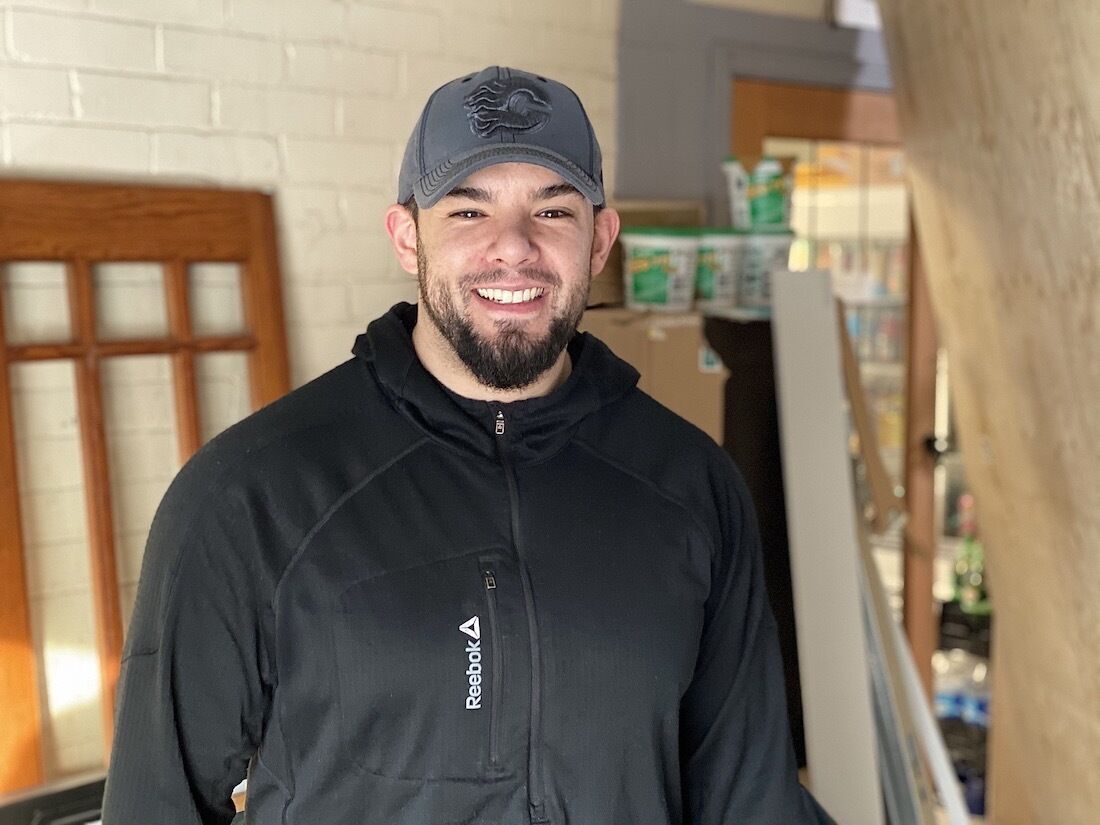
JEREMY: And for you, what made you want to do that? You've obviously seen your grandparents run the store from when you were young, and now you're kind of taking it on yourself to do your own take on it.
SOURAYA: That's exactly right. We want to bring it back to life. I just want to get it going again, and keep it in the family, and hopefully people kind of start coming around again. It was really busy before. It was a really hot area, but it's kind of slowed down a little bit, so I'm hoping to kind of bring new faces around here, or the old ones, and just kind of – yeah, hopefully bring it back to life.
JEREMY: So you've got three generations that are all pitching in to build the next iteration of this place for the community.
What the store has meant
We're going to listen now to Moe's aunt and Fariza's daughter, Amy Side, and she recalls what it was like to grow up above the grocery store. She went to school right across the street.
SIDE: I was born and raised in Calgary and we moved to Winnipeg, and during the time we lived in Winnipeg, my parents owned a grocery store just like this, where the living quarters are attached to the store, so I was used to having candy and pop and chips all around me, but when we lived here I would come across the street and always want candy on the lunch hours.
JEREMY: And when you think back to those days, what do you think the store meant to the community?
SIDE: The store was a hub for the community. People would come in here and just hang out. They wouldn't actually buy anything or need anything. They would just come for conversation with other people or to ask who a plumber was or to say, "Hey, listen, I haven't seen my neighbour in a week. Have you seen them?" And we would always have people in and out of the store.
And when my parents opened up the ice cream store in the back of the store, people actually put seating back here so they could just sit and hang out. So this building has been a very, very integral part of this community.
The store was a hub for the community. People would come in here and just hang out.
JEREMY: And what happens when a community loses a place like this? Because this – it hasn't happened here, but it does happen in a lot of other neighborhoods, where you've seen these kind of places disappear. I think you had mentioned Crescent Heights. I mean, we could put together a long list of them.
SIDE: You know, from the research I did when we changed over the proposed zoning, I learned that mom-and-pop shops had a height in the '70s. That's where you would have most mom-and-pop shops. That's where you wouldn't see so many Safeways, but you'd see a lot of these places. And they've had a decline, and they've had a drastic decline over the last, you know, 40 years.
And these places are now – there are only a few in Calgary, and those few are slated to shut down as well. So I think that for our society and how we all live on technology and we don't see each other that often, that places like this are a necessity, and they should be celebrated and treasured, and we should try to maintain them so that all of us can have their benefit.
I think that for our society… places like this are a necessity, and they should be celebrated and treasured.
And my parents are actually very savvy as well. Not only did they run this business and raise five children, they also ran this business without a computer, without any help from other people outside of our family. We all – all of us – all of us – worked in this store.
And my parents were entrepreneurial in the fact that they brought in fresh flowers over the summer so people could grow gardens, and in the winter they'd bring in specific things, and they were very entrepreneurial. So I thank my parents that I was allowed to be raised in such an environment where I, too, had that spirit of wanting to live in my community, be a part of my community, as well as be an entrepreneur.
Local kids: 'They have good candy!'
JEREMY: We're going to come back to that interview with Amy Side, but first I want to bring in a couple of subject matter experts on this corner store: my kids.
JEREMY: What would it mean for you if that store wasn't in the neighborhood?
SAM (AGE 8): Well, I don't know. I would be pretty sad, because sometimes I like bringing my money to school and then after, going there and getting some candy.
JEREMY: And what kind of stuff do you buy there?
LAILA (AGE 10): [laughs] I buy Popeye Candy Sticks and gum and gummies.
SAM: There's chips – a big bag of chips for only five dollars. But the drinks there are a little expensive because they're three dollars, but other than that it's pretty good.
JEREMY: And how are the people when you go in there?
SAM: They're good. Like, the prices aren't on [some of the items], so you can ask them and then they tell you, so they're nice. Yeah.
If you don’t have a car and you can’t go places super far away, you can just go there and there’s a bunch of food.
JEREMY: Do you remember when I told you over Christmas that the corner store might be closing?
LAILA: Yes. [laughs]
JEREMY: You think that's funny?
LAILA: [laughing] No. No! It's weird being interviewed by you.
JEREMY: What would it mean to you if that store wasn't there?
LAILA: I'd feel sad.
JEREMY: Why would you feel sad?
LAILA: Because they have good candy and chips, and the people that work there are nice, and they also have good pop and Jones Soda and stuff.
JEREMY: And how many of your friends at school – like, your classmates – do a lot of people go to the store?
LAILA: Yeah. Other kids at school, too, that are – so in seventh grade and above, you're allowed to go to out of the bounds at lunch, and you can, like, go to the corner store.
JEREMY: Are you jealous?
LAILA: Totally!
JEREMY: Are you going to do that in grade 7?
LAILA: Obviously.
JEREMY: Why do you think these kind of places are important in neighborhoods? Like, the corner store – why do you think it's important to have?
LAILA: Because they're usually – they can be close to your house, and they also have good stuff.
SAM: It's because if you don't have a car and you can't go places super far away, you can just go there and there's a bunch of food.
JEREMY: Yeah. All right, well, thanks for your time and insights here today.
SAM: Thank you.
The walkable grocer
While I was working on this episode, I read about another local grocer that's really struggling to stay afloat: The Bownesian Grocer, in Bowness.
Struggling neighbourhood grocer hoping to produce better results with Calgary-wide plan: https://t.co/Jls7QWirho #yyc #yyccc #yycca
— Brett Klassen (@brettklassen5) January 10, 2020
It's bigger than just a corner store, but they're dealing with a lot of the same issues as an independent shop, and now there's been a bit of a rallying cry in the community to support them and keep the grocery store afloat.
Can I get a RT? The @BownesianGrocer needs your help! This local grocery store in Bowness has done so much for others in need. Now it is our turn to help them. When was the last time you visited?
— Ward Sutherland (@Ward4Ward1) January 7, 2020
Read more here: https://t.co/SrgWQhoWdX #yyc #yyclocal @demetriosnAB pic.twitter.com/MH5klpxnXD
So this isn't something that's just specific to one neighborhood. This is playing out all across the city – sometimes in ways that are visible; sometimes in ways that we don't see.
We're going to go back now to hear more of my conversation with Fariza Thraya's daughter Amy at Stanley Jones Grocery in Renfrew.
JEREMY: You mentioned that in the '70s it was kind of the heyday of these shops. And what are the challenges now as compared to then?
SIDE: I remember when the first Superstore came into Calgary. It was a big deal. Back then, we didn't have as many places like Safeway, Co-op – those kinds of places – as well as, people only bought what they needed when they needed it, whereas now people could go online, they could get their groceries online, they can get their – everything they want online, and it can be delivered.
Whereas before, a lot of people didn't drive, or they didn't have access to resources the way we do today, and now people tend to drive, whereas the most of our customers since I was a child, are people walked.
They walked; they grabbed milk; they came back; they came and got eggs; they came back.
People only bought what they needed when they needed it.
And my parents also – one of the things I want to mention that I'm very proud of that my parents did, my parents extended store credits to most of the people that lived in this area.
So if you needed something to eat and you didn't have money, my parents would allow you to take groceries from their store and they'd say, "Pay me when you can." And there was a time where they didn't write it down. They just let you take it.
And it became so big that so many people needed their help – you know, we were here in the '80s, the '90s, the 2000s – they got a book and they started writing it down, and if they didn't get paid, they didn't get paid. They weren't going after people. But that's how much necessity this place was for a lot of people. Yeah.
So that's something I'm very proud of.
JEREMY: Yeah, that's really cool. And something you can't do at, you know, your Safeway.
SIDE: Or a 7-Eleven. You can't do any of that. And not just that – like, I remember there was a time that one of my mom's customers' friends had some issue and my mom was worried about her, so she went and – because we had delivered groceries to her, she went and asked me to go check on that person. And just the inner, like, relationships that held our community together, you know, I'm very proud of.
We all enrich each other’s lives, and we need to stay focused and present on that.
JEREMY: I think you hit on it when you say "relationship." Like, it sounds like, you know, that's why they were able to extend store credit. They knew these people. Like, that – it seems like we lose that, or it's hard to find that, in our day and age.
SIDE: Yeah. They were – my parents are not rich. They were struggling as well. And they saw their experience through other people's eyes. So it's not about making money for my parents. It's always been about, how can we be the best people we can be, and how can we be a reflection of that for our kids so that they can be that?
So my parents really believed in, you do for others before you do for yourself. You take care of the weakest. You don't allow the weakest to fall. And we all – we all enrich each other's lives, and we need to stay focused and present on that.
My hope is that it will return to its former glory as being a hub for the community. So the back area right now we're going to set up as a barber shop for my nephew to cut hair and bring people into the – so people can walk to get a haircut rather than drive.
Also, the front of the store is struggling. The grocery store is not seeing the amount of people it used to. There was never – in the time that I lived here, there was never a time where there wasn't a customer in the store.
Now you could go a half an hour, 45 minutes, with no one walking in. It's not fair to her business, and it's not fair to the community, that it remain like that, so we're going to either help her get stronger or we're going to think of other ways we could do something.
We're trying to invest in her – and her family, as well.
I hope the barber shop will help the store stay alive, and I hope this store helps the barber shop stay here, too.
But we want this to be a place where people come and enjoy it. We want this to be a place where if you didn't have lunch, you can come here and grab a lunch. If you just need to see somebody, you could come in here and it's a happy place. That's what we'd like.
And in five years, I would like – I would like people to say, "Oh, have you been to Stanley Jones today? I saw this person there." That's what I would like.
JEREMY: Yeah, because it's those community connections that mean something to people, right?
SIDE: That matters. At the end of the day, what do we leave with but our relationships? And those matter.
FARIZA THRAYA: And I hope the barber shop will help the store stay alive, and I hope this store helps the barber shop stay here, too.
A hard business, but a good one
JEREMY: And what advice would you give to, you know, people who either are running a shop like this right now or maybe have an idea to start something like this in their community today?
THRAYA: I would still encourage them to do it. It's a hard business, but I think it's a good business, and if you take care of it and love your community, the store and the community will love you back.
JEREMY: When you look back on your experience raising a family here, running the shop, what are the things that you yourself have taken away from that experience, when you reflect on the decades you've been doing that?
THRAYA: That it was the best thing I could've done. I was around my children, and they were safe and they were happy. And the community was wonderful. On the day of one of my daughter's weddings we forgot to lock the store, so one of our customers wouldn't allow anybody to take anything out of the store, waited for the police to come, and took care of locking up our store and making sure we were okay. It's a wonderful community.
And people would – if I wasn't well, people would come – like, when I broke my leg, the neighbors would come and do my dishes and make my meals and make things for the deli. One Ukrainian woman, she worked at the church making perogies, so she came and made 500 perogies for me. She said, "Missus, you need help. I'm going to help you." She came and did all my work for me. It's a wonderful community. I think Renfrew is the best community in Calgary.
JEREMY: I agree. Although we're biased.
THRAYA: [laughs] Yes. A lot of years. A lot of love.
If you take care of it and love your community, the store and the community will love you back.
JEREMY: Yeah. You mentioned some of the customers you've had over the years. I imagine you had some regulars that you really got to know – some characters. Are there any that stick out in your mind?
THRAYA: Yeah. The most beautiful woman that came here, she was an elderly woman. Her name was Virginia Kiss. And her last name is Kiss, so you remember that. She'd come every day. She had nothing to do so she'd come for tea, and one day she'd say, "I want to buy you a cream horn." And I'd say, "No, no, I'll buy it." And we'd had to fight for her not to pay.
And she was wonderful. She made a little tin can man that advertised my menu, so I was making fatirs and pies and things, and she made the menu out of tin cans, and she hung it up. She built a cart for flowers and plants that we sold here.
She was just the most wonderful person I ever met. Kindest. And she came for years until she passed away. So there was so many beautiful people.
A small, easy way to build community
JEREMY: Here's something to consider: When you go to a corner store like this, you're one of those beautiful people. You're one of these characters. The current store owner, Yeim Kwak, told me that that's one of the things that she enjoys most about running the store: the conversations that she gets to have, and the fact that the store can brighten somebody's day just by having that little bit of connection.
So you can be part of that. Doesn't take a whole lot – just go to your local corner store. I'm a pretty introverted person, but even I can muster that up. When you do that, you're making your community better. It's not always the big things. It's the little things.
I'm excited to go to Moe's barber shop when it opens later this year.
JEREMY: As you head into this – you know, it's not an easy go running your own business – yeah, how are you feeling heading into that? That's not an easy road.
SOURAYA: No, it's not. It's already been a lot of work. It's going to be more work once we get in there. But it's how it goes, right? We've got to work hard. That's how grandpa and grandma did it, and that's how I'll do it.
We’ve got to work hard. That’s how grandpa and grandma did it, and that’s how I’ll do it.
SIDE: The reason that they've had two grocery stores in their history is because they were unemployable because of that immigrant experience. So I think when you reflect back the store and the fact that right now the lady and the man that are running this place are also immigrants, it really speaks to our society and what we find to be important.
We all want a living, and this is somebody's living. This is somebody's dream. This is somebody's everything. And us supporting it supports a dream, supports a family, supports a new life, supports a new beginning. So I think that's really important.
The one thing I really want to say is don't write us off. If you write off Stanley Jones and all these little mom-and-pop stores like this, you're writing yourself off. You're writing your community off.
We really believe in the idea that together we are better and together we are one. So if you drive by, come in and say hello. If you walk by, come in and say hello.
Jeremy Klaszus is editor-in-chief of The Sprawl.
Support in-depth Calgary journalism.
Sign Me Up!We connect Calgarians with their city through in-depth, curiosity-driven journalism—but can't do this alone! We rely on our readers and listeners to fund our work. Join us by becoming a Sprawl member today!
